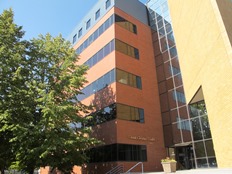
A public utility company is an organization that maintains the infrastructure for a public service. Public utilities are subject to forms of public control and regulation ranging from local community-based groups to statewide government monopolies.
Eversource Energy is a publicly traded, Fortune 500 energy company headquartered in Hartford, Connecticut, and Boston, Massachusetts, with several regulated subsidiaries offering retail electricity, natural gas service and water service to approximately 4 million customers in Connecticut, Massachusetts, and New Hampshire.
A public utilities commission is a quasi-governmental body that provides oversight and/or regulation of public utilities in a particular area, especially in the United States and Canada.
The Kansas Corporation Commission (KCC) is the public utilities commission of the state of Kansas run by three Commissioners appointed by the Governor with the approval of the Senate. The Commission has the responsibility of ensuring that natural gas, electricity, telephone, and transportation vendors provide safe, adequate, and reliable services at reasonable rates. Notwithstanding the commission's name, it does not charter corporations; that function is performed by the office of the Secretary of State.

The California Public Utilities Commission is a regulatory agency that regulates privately owned public utilities in the state of California, including electric power, telecommunications, natural gas and water companies. In addition, the CPUC regulates common carriers, including household goods movers, limousines, rideshare services, self-driving cars, and rail crossing safety. The CPUC has headquarters in the Civic Center district of San Francisco, and field offices in Los Angeles and Sacramento.

Enmax Corporation is a vertically-integrated utility with operations across Alberta, Canada, and in Maine, US.
The Public Utilities Commission of Ohio (PUCO) is the public utilities commission of the U.S. state of Ohio, charged with the regulation of utility service providers such as those of electricity, natural gas, and telecommunications as well as railroad safety and intrastate hazardous materials transport.

The Oklahoma Corporation Commission is the public utilities commission of the U.S state of Oklahoma run by three statewide elected commissioners. Authorized to employ more than 400 employees, it regulates oil and gas drilling, utilities and telephone companies.
The Florida Public Service Commission (FPSC) regulates investor-owned electric, natural gas, and water and wastewater utilities. The FPSC facilitates competitive markets in the telecommunications industry, has authority over intercarrier disputes, and oversees pay telephones, the federal Lifeline Assistance Program and Telecommunications Relay Service.

The Oregon Public Utility Commission (PUC) is the chief electric, gas and telephone utility regulatory agency of the government of the U.S. state of Oregon. It sets rates and establishes rules of operation for the state's investor-owned utility companies. With respect to publicly owned utility districts and cooperatives, its authority is limited to safety regulations.
The Maryland Public Service Commission (PSC) is an independent administrative agency within the state government which regulates public utilities and certain taxi cab and other passenger services in Maryland. Similar to other state public utilities commissions, the Maryland PSC regulates and sets tariff rates for natural gas, electricity distribution, local telephone, water, and sewage disposal companies. The PSC also sets the tariff rates for pilot services for vessels and privately owned toll bridges, approves the construction of electric generating plants and overhead transmission lines with a voltage above 69 kV, and licenses retail natural gas and electricity suppliers. The PSC offices are located in Baltimore in the William Donald Schaefer Building.
The Georgia Public Service Commission (PSC) is a statutory organ of the state government of Georgia; elected among five commission districts, the board consists of a Chairman, a Vice-chairman, and three Commissioners. PSC regulates telecommunications, transportation, electric and natural gas services in the U.S. state of Georgia. Commissioners are elected in partisan elections statewide, though they must reside in a district.
The Iowa Utilities Board (IUB) is a three-member public utilities commission, with beginnings in 1878. It is a quasi-judicial tribunal, which regulates services and rates of electric, natural gas, water and telecommunication providers, as well as all pipelines and transmission lines in the U.S. state of Iowa and has existed with its present name since 1986.
The Kentucky Public Service Commission is the public utilities commission for the State of Kentucky.
The Public Service Commission of Wisconsin is an independent regulatory agency responsible for regulating public utilities in the energy, telecommunications, gas and water companies located in U.S. state of Wisconsin. As of 2021, the agency regulated more than 1,100 electric, natural gas, telephone, water, and water/sewer utilities.
Algonquin Power & Utilities Corp. is a Canadian renewable energy and regulated utility conglomerate with assets across North America. Algonquin actively invests in hydroelectric, wind and solar power facilities, and utility businesses, through its three operating subsidiaries: Bermuda Electric Light Company, Liberty Power and Liberty Utilities.
The Indiana Utility Regulatory Commission (IURC) is the public utilities commission of the state of Indiana, led by five commissioners appointed by the governor.
The Public Service Commission of West Virginia is the Public Utilities Commission of the State of West Virginia, U.S.A.

The Mississippi Public Service Commission is a government agency which regulates telecommunications, electric, gas, water and sewer utilities in the U.S. state of Mississippi. The commission was created in 1884 and in its early history was tasked with regulating various transport and telecommunications industries in the state. It assumed its current name in 1938 and was given jurisdiction over electric, gas, and water utilities in 1956.
The United States state of Arkansas is a significant producer of natural gas and a minor producer of petroleum.





